Investing
As Recession Fears Grow, 15 Stocks to Survive a Stock Market Correction

Published:
Last Updated:

Friday brought on major selling in the stock market, with the Dow Jones industrials down over 400 points and the S&P 500 down almost 50 points earlier in the day. The plunge is driven by weak economic readings in the United States and abroad, and recession fears from the dreaded inverted Treasury yield curve. Unfortunately, the mainstream and financial media alike love reporting about how the next recession is right around the corner. It doesn’t seem to matter if that’s not exactly true. The reality is that Friday’s big sell-off was long overdue after the Dow and S&P 500 had recovered in the double-digit percentages so far in 2019.
24/7 Wall St. already has evaluated the “why” about Friday’s selling, and investors always have to remember to be opportunistic when they need to. Despite our jaded view of financial news coverage these days, the reality is that the sell-off could easily continue to gain steam in the coming days and weeks. A lot has to do with trade woes, but the international situation is far more cautious than the domestic situation, without even considering any trade wars and tariff woes.
During times of uncertainty and fear, many investors have to look for a place to hide when they know that they have to keep having income from investments to supplement their income, retirement or financial planning needs. This is when investors have to look for stable and defensive stocks that will hold up in bad times and still do well in good times.
There will be another recession one day, but all the available data today just doesn’t show it as a real risk for the coming months, even if the slower economic growth may feel weak. Media forecasts for the next recession seem to be very far ahead of market gurus and economists who just evaluate the raw numbers and data.
A news search of Google Trends indicates that the term “recession” saw a sharp rise in interest on the web on March 22. Another term that saw an even larger surge in Google Trends was “inverted yield curve.”
With multiple financial stories calling the recession lights and indicators as flashing red, they are really referring to the flat yield curve turning into an inverted yield curve. This is where short-term interest rates are higher than intermediate and long-term interest rates. Market participants often consider that a recession indicator because the Federal Reserve has short-term interest rates higher than the long-term growth prospects would indicate — and it also can imply that the Fed has overshot to the upside on its rate hikes that ended at the end of 2018.
Since it is already a foregone conclusion that investors have to keep at least some money in stocks for dividends and long-term appreciation, we have offered a view of 15 stable and defensive stocks and investments outside of bonds that will hold up if the market selling persists for days or weeks. They might not exactly rally in bad markets, but they should take less of a beating than the market if they act normally.
The list includes the most recent share prices, a 52-week trading range, and the current dividend yield on each company. We also have included information about each company’s history, revenue or the size of its customer base. Expected revenue figures are from Thomson Reuters.
Investors should always consider that there are no assurances that defensive stocks will hold up in a down market. If the market loses 10% or 20% of its value in a short period, it tends to hurt most equities, although defensive stocks might hurt less. Here are 15 top defensive stocks that investors are likely to pour money into if they become worried about the next selloff turning into a major correction or even a bear market.

1. American Water Works Co. Inc. (NYSE: AWK), $106.00
> Industry: Utilities
> Yield: 1.8%
> 52-week range: $77.73 – $107.71
> Market cap: $19 billion
This is America’s largest pure-play water utility, serving drinking water, treating wastewater and other related services to roughly 14 million people in 45 states. The reality is that people are going to drink water, use water at home for food and cleaning, and shower every day.

2. American Electric Power Co. Inc. (NYSE: AEP), $85.00
> Industry: Utilities
> Yield: 3.2%
> 52-week range: $62.71 – $85.71
> Market cap: $42 billion
American Electric Power is a major electric utility in America and has operated for more than 100 years. At last look, it served nearly 5.4 million regulated electricity customers in 11 states, and it uses nearly all sources of energy to produce electricity.
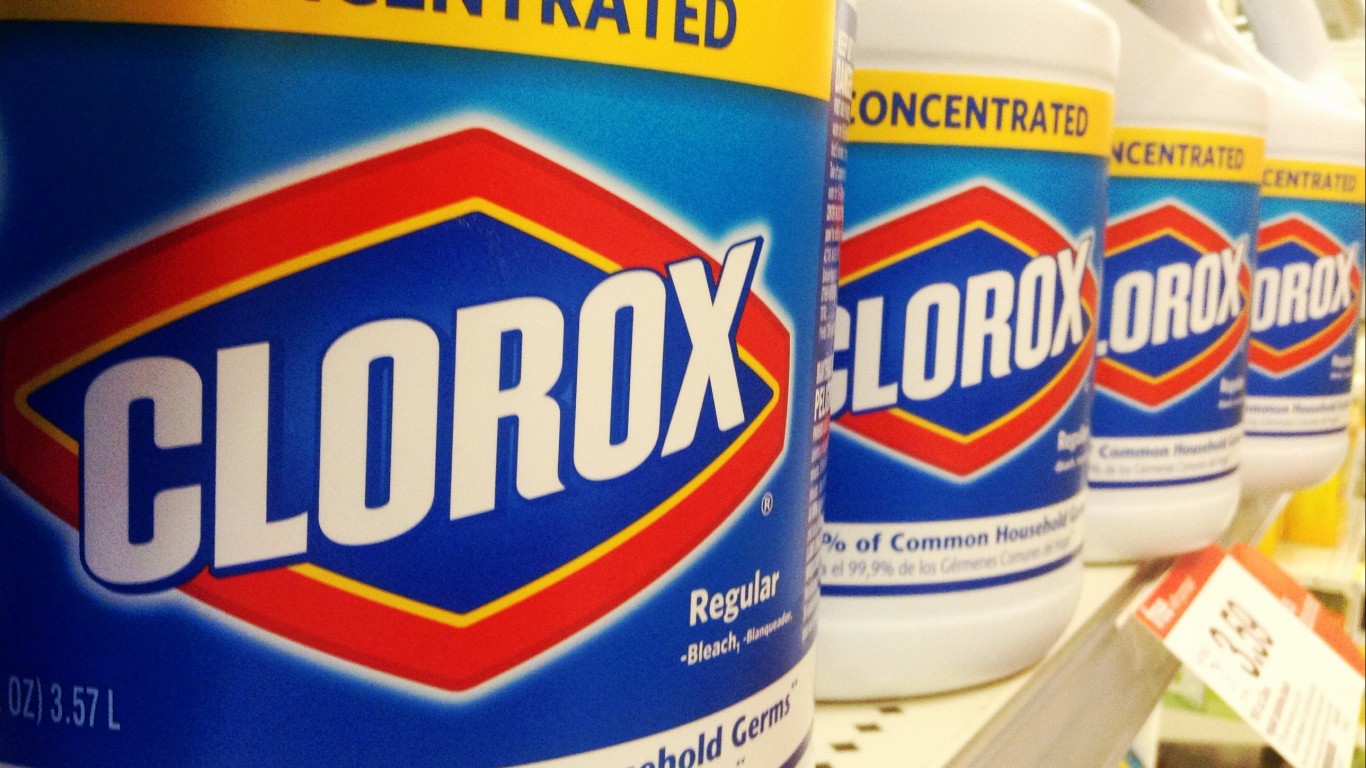
3. Clorox Co. (NYSE: CLX), $158.00
> Industry: Consumer products
> Yield: 2.4%
> 52-week range: $113.57 – $167.70
> Market cap: $20 billion
Clorox may not be as large as some of its consumer products competitors, but the company has operated for more than 100 years and markets many consumer goods outside of its cleaning and bleach products, including household chemicals, petcare products, water filtration, food, and so on. Its shares soared more than 40% from trough to peak in 2018 — proof that it can withstand rocky markets. The shares previously pulled back in 2019.
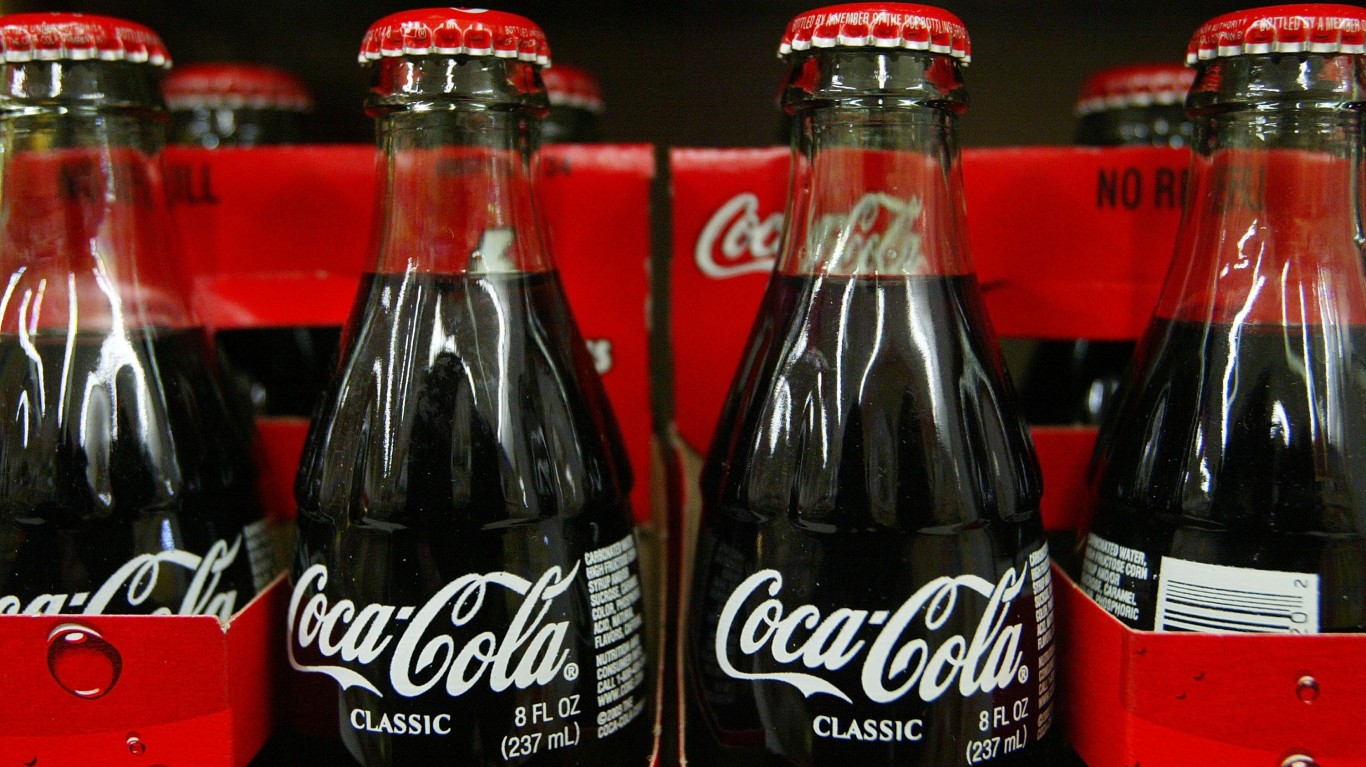
4. Coca-Cola Co. (NYSE: KO), $45.90
> Industry: Beverages
> Yield: 3.5%
> 52-week range: $41.45 – $50.84
> Market cap: $197 billion
Dating back to the late 1800s, Coca-Cola is perhaps the most widely recognized beverage maker in the world. The company has increased its beverage choices outside of soda drinks over the years, adding water, sports drinks, health drinks, tea, coffee, and so on. Revenues are expected to grow to $33 billion in 2019, an increase of more than 5%. Its shares have pulled back so far in 2019 after a disappointment in earnings.
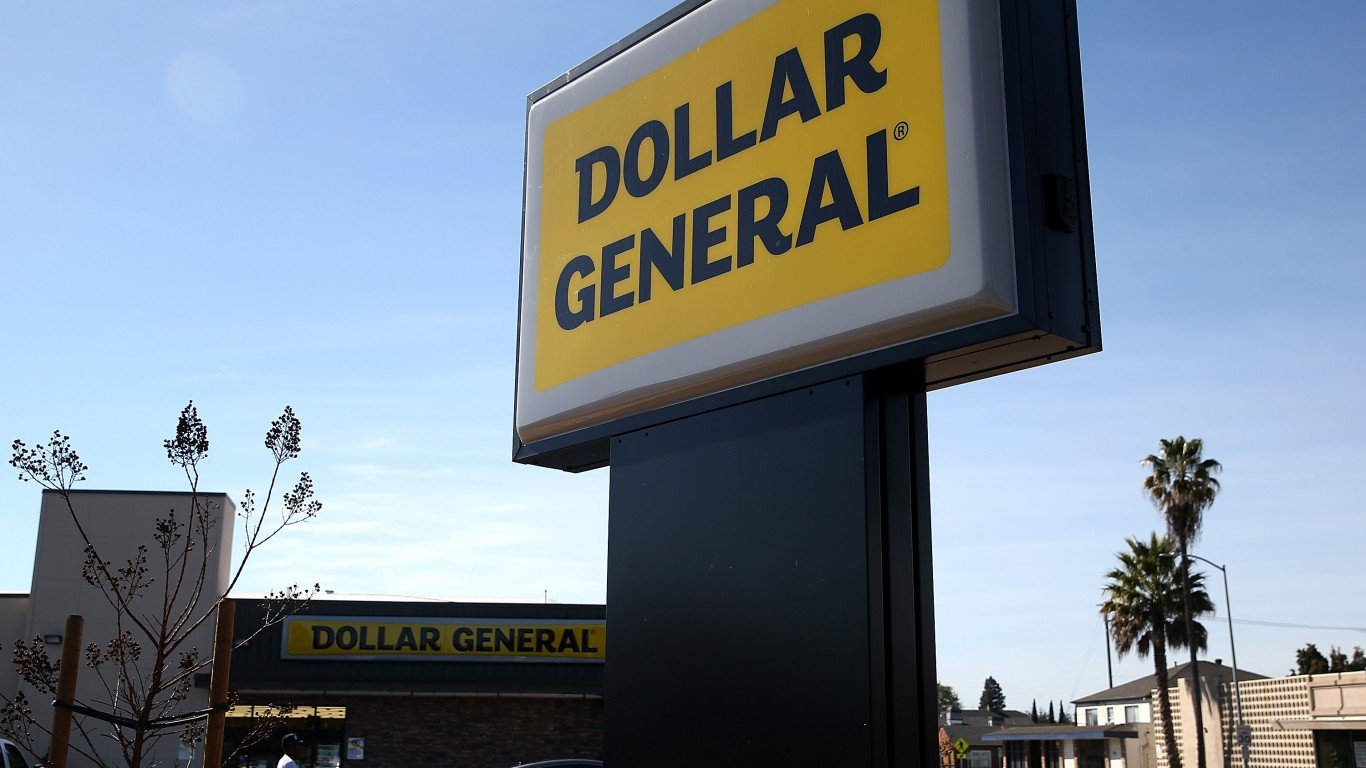
5. Dollar General Corporation (NYSE: DG), $117.50
> Industry: Discount retail
> Yield: 1.0%
> 52-week range: $85.54 – $121.27
> Market cap: $31 billion
The nation’s most dominant dollar store retailer turned in positive gains in 2018, and it continues to find new niche geographies in which to open new stores. It dates back to before World War II during the Great Depression, and it has now expanded to offer higher priced goods with more than 15,000 stores in 44 states. Dollar stores proved to have a strong business model during and after The Great Recession a decade ago. Its shares pulled back handily in March on earnings but have since recovered.

6. Duke Energy Corp. (NYSE: DUK), $90.50
> Industry: Utilities
> Yield: 4.15%
> 52-week range: $71.96 – $91.66
> Market cap: $66 billion
Duke Energy is one of America’s largest electric utilities by coverage and by market cap. It also provides gas and infrastructure services to consumers and organizations alike. It had roughly 7.6 million electricity customers in six states at last count. The company’s annual revenue is nearing $25 billion.
[in-text-ad]
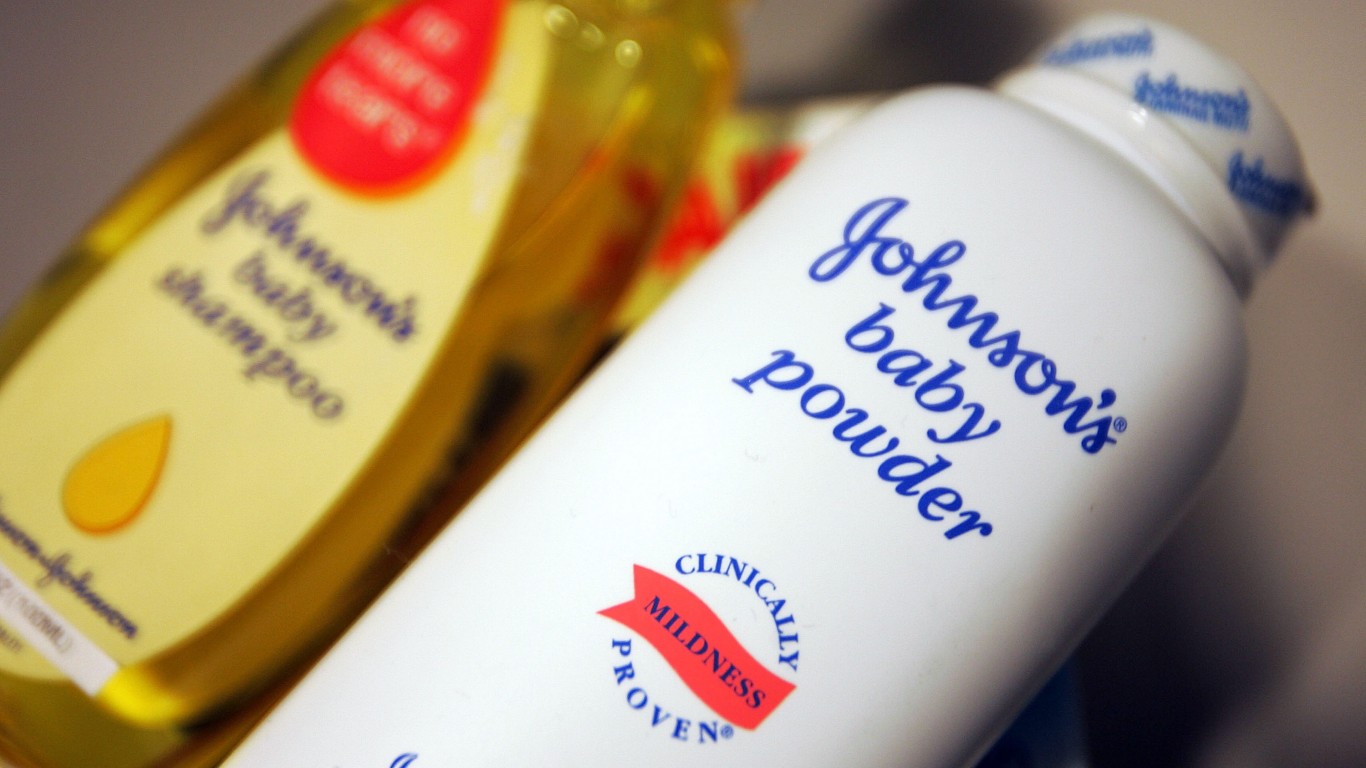
7. Johnson & Johnson (NYSE: JNJ), $137.00
> Industry: Health and consumer products
> Yield: 2.6%
> 52-week range: $118.62 – $148.99
> Market cap: $360 billion
Household name Johnson & Johnson produces and markets not only consumer products, but also drugs and other medical products and devices, meaning it is diversified enough to withstand good times and bad. A recent wave of bad news relating to asbestos in talcum powder has kept a cloud over J&J, but the company has a long history of overcoming and surviving any hiccup that come its way. Revenues are expected to rise be close to 2% to almost $83 billion in 2019.
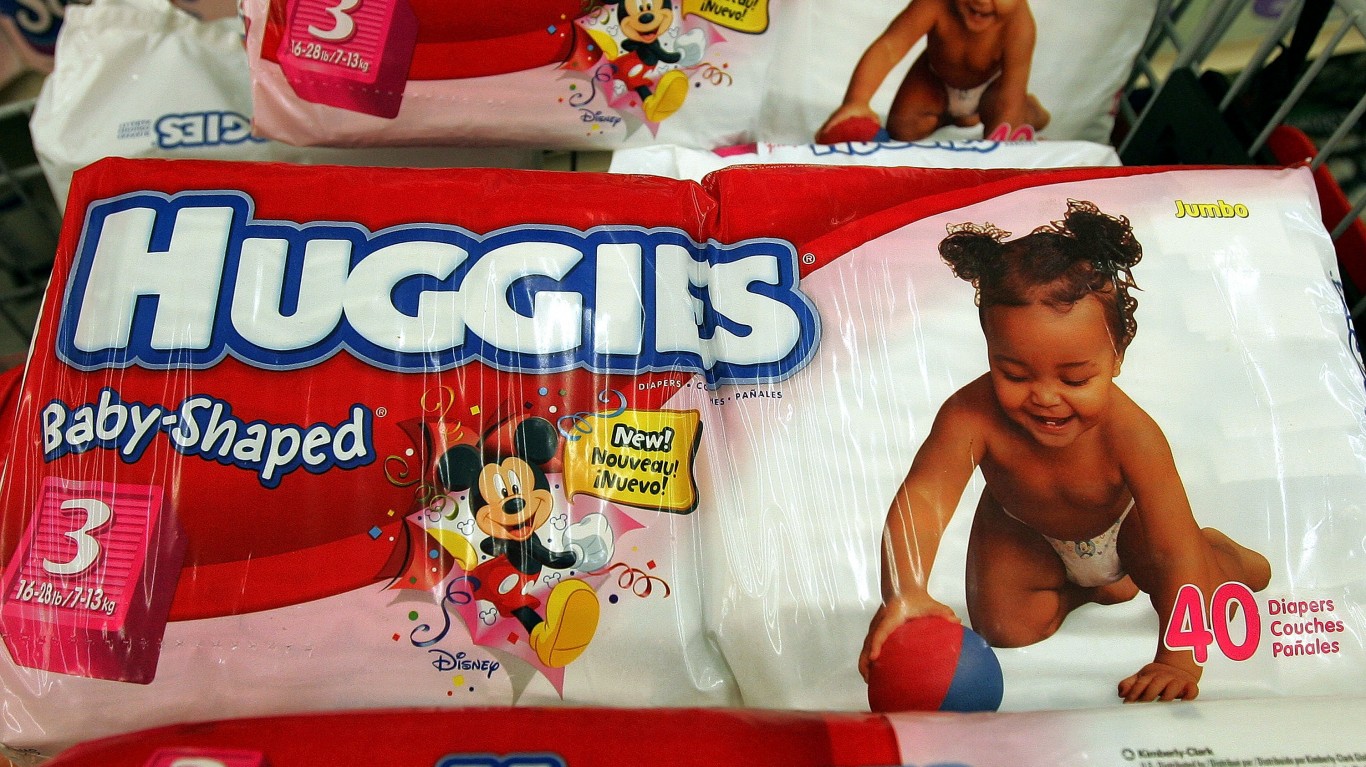
8. Kimberly-Clark Corp. (NYSE: KMB), $122.00
> Industry: Consumer products
> Yield: 3.4%
> 52-week range: $97.10 – $123.50
> Market cap: $42 billion
Kimberly-Clark is one of the world’s best-known consumer brands companies, with products in personal care, tissues, soaps, paper towels, and so on, many of which familiar household names. Revenues have been flat, but shares performed well during much of the stock market malaise in late 2018 and again into 2019.
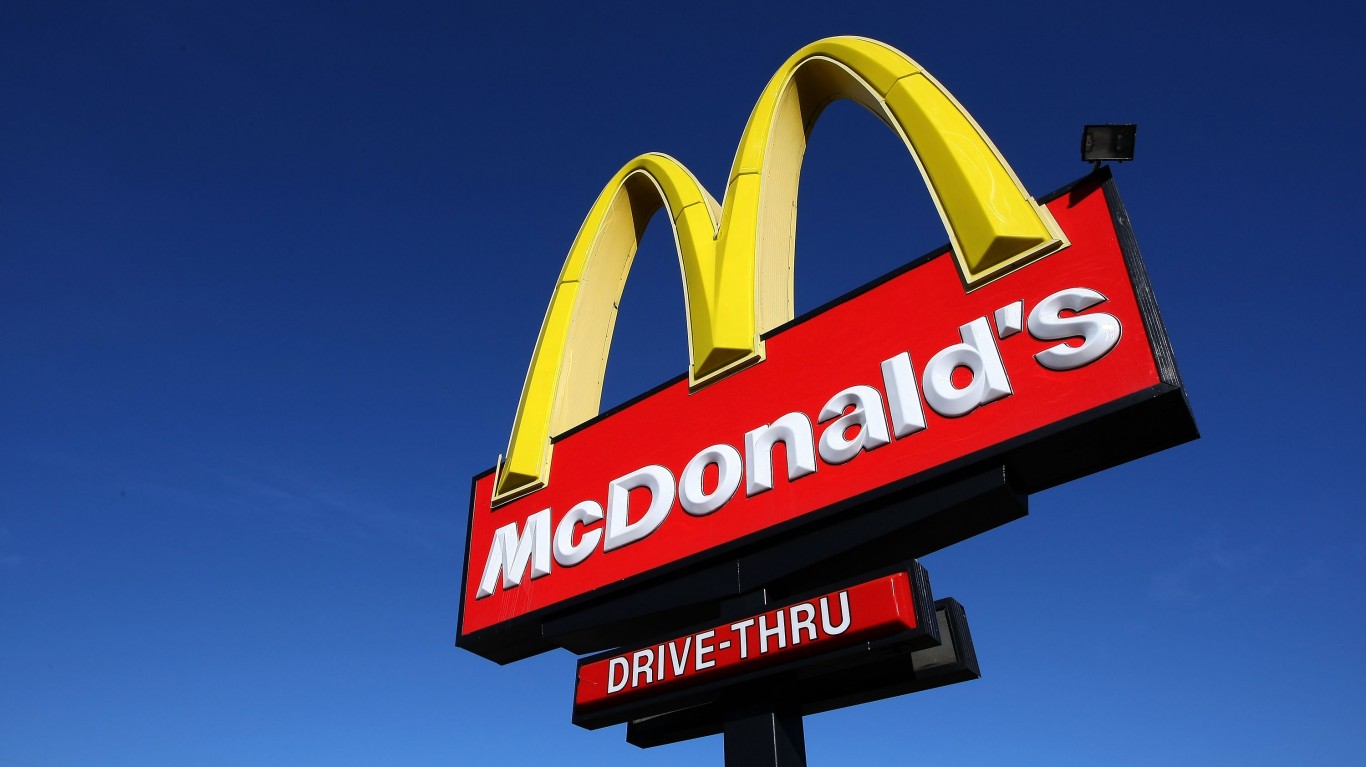
9. McDonald’s Corp. (NYSE: MCD), $187.50
> Industry: Fast food
> Yield: 2.6%
> 52-week range: $146.84 – $190.88
> Market cap: $144 billion
The home of the Golden Arches has made major changes to its menu and food quality, and it has become as defensive as you can get for a fast food company. McDonald’s has made efforts to sell higher quality food to attract younger people, and it is still more than affordable as a place to feed a whole family.
[in-text-ad-2]

10. Merck & Co Inc. (NYSE: MRK) $82.00
> Industry: Pharmaceutical
> Yield: 2.8%
> 52-week range: $52.83 – $83.45
> Market cap: $210 billion
The Big Pharma giant was the Dow’s top stock in 2018, with a gain of more than 35% on the year. While many pressures exist regarding drug prices and patent expirations, Merck’s reputation has been boosted by a strong pipeline of drugs, including the cancer treatment Keytruda. While the risks mentioned might put pressure on the stock, Merck more than proved it was a top defensive stock throughout 2018. Merck has continued to deliver upside in 2019.
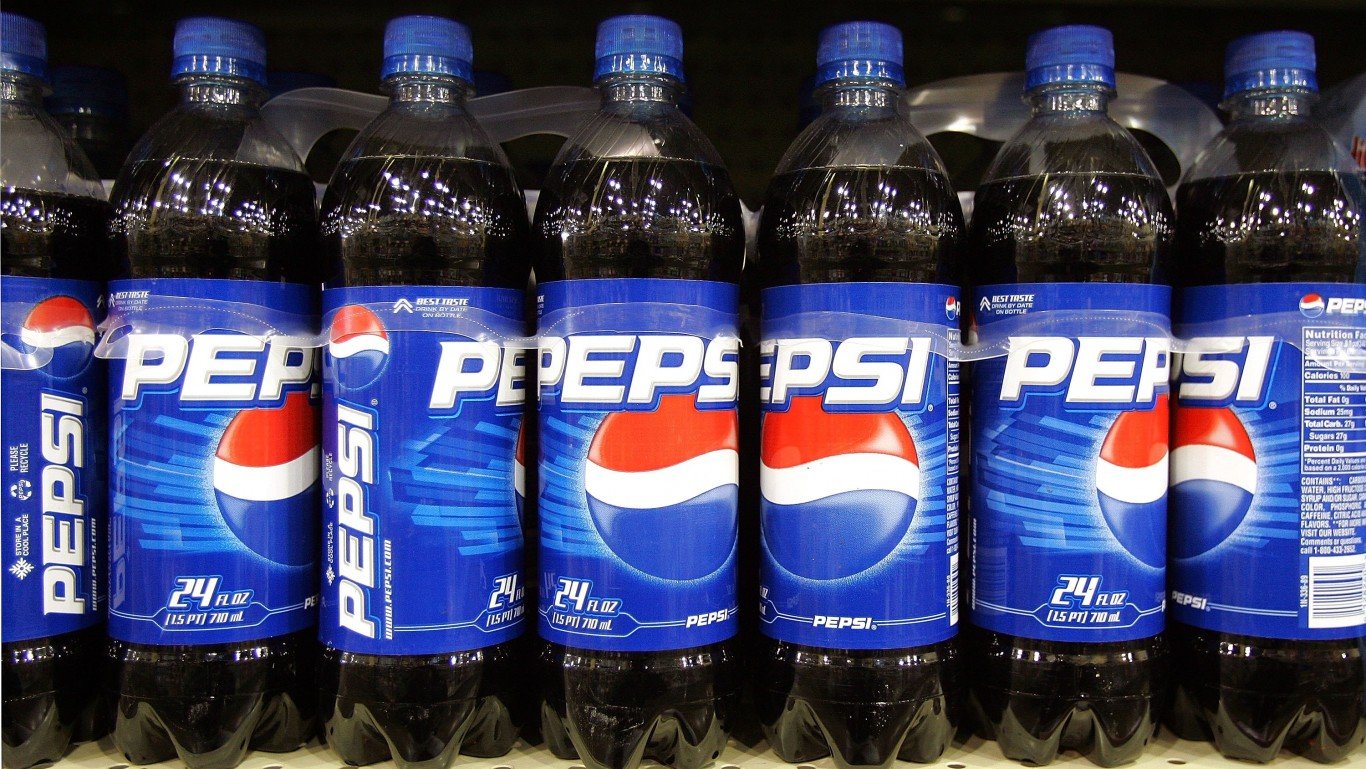
11. PepsiCo Inc. (NYSE: PEP), $120.00
> Industry: Beverages
> Yield: 3.15%
> 52-week range: $95.94 – $122.51
> Market cap: $167 billion
Pepsi is perhaps even more diversified than rival Coca-Cola because it has that giant snack food business on top of its carbonated beverages, water, and other drinks. The company is more than 100 years old and revenues are expected to increase by about 3% to roughly $66.5 billion in 2019.
[in-text-ad]
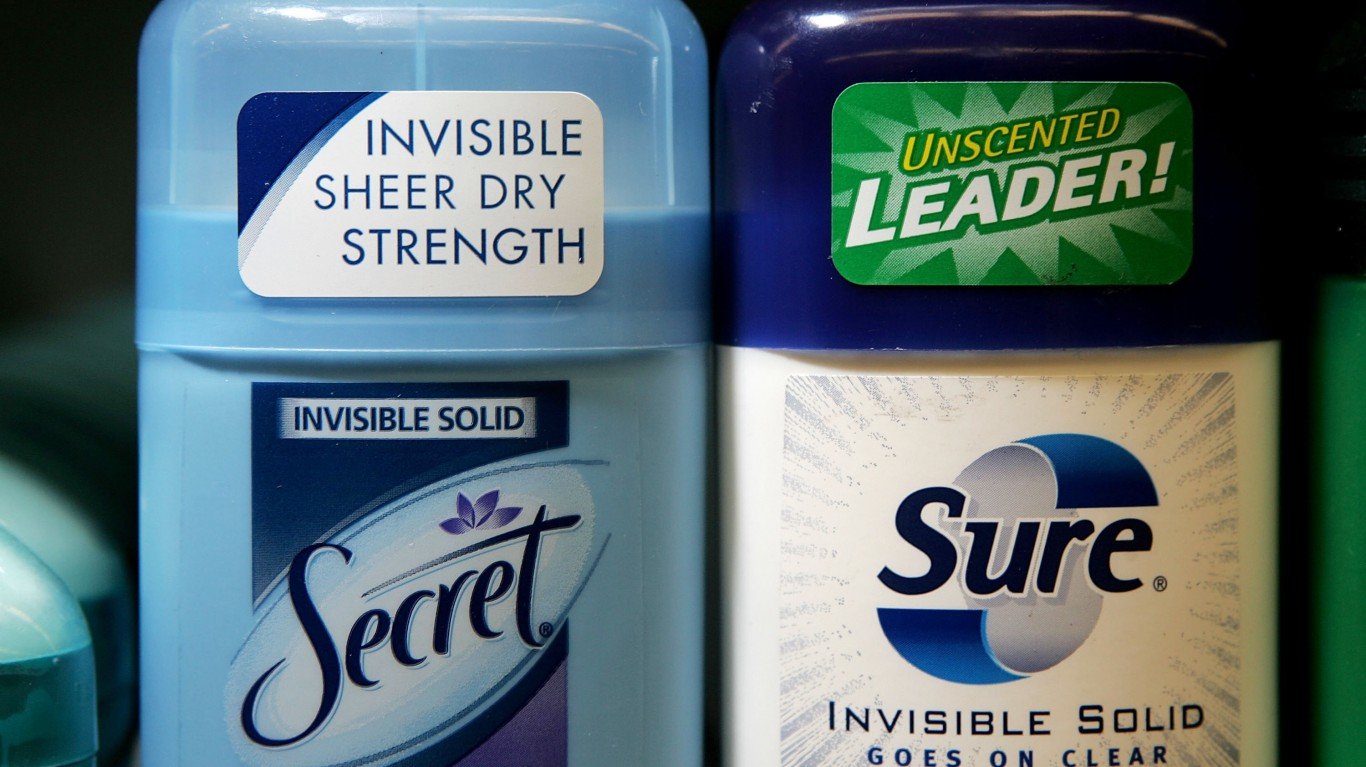
12. Procter & Gamble Co. (NYSE: PG), $102.00
> Industry: Consumer products
> Yield: 2.9%
> 52-week range: $70.73 – $103.15
> Market cap: $250 billion
Being the world’s largest consumer products company and selling soap, shampoo, diapers, and dozens of other recession-proof items seems to have its positives. Sales are expected to rise by 3% to almost $69 billion in 2019. The stock has continued to perform well since January in 2019 and recently hit an all-time high.
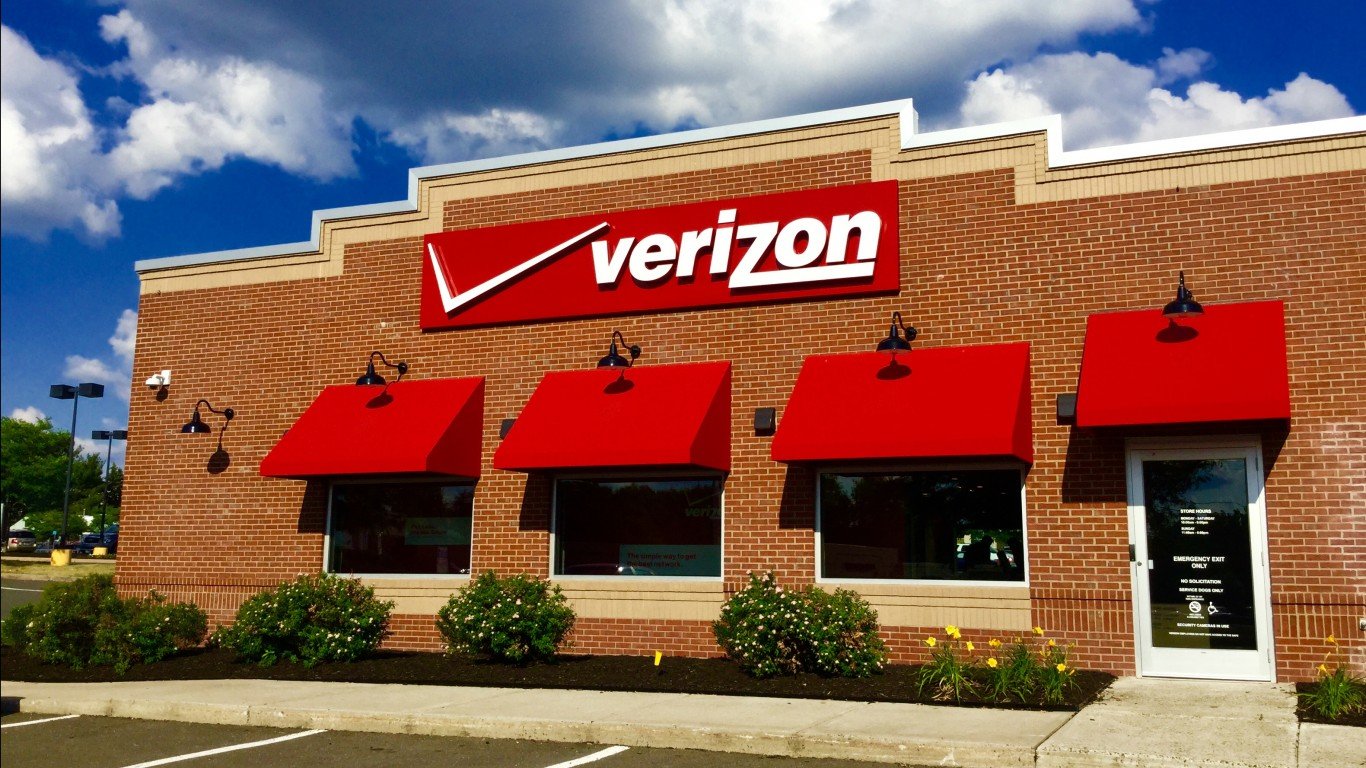
13. Verizon Communications Inc. (NYSE: VZ), $59.00
> Industry: Telecommunications
> Yield: 4.1%
> 52-week range: $46.09 – $61.58
> Market cap: $244 billion
Verizon avoided the same extreme acquisition path as rival AT&T, and it is now considered much more defensive as it remains a pure-play among the top domestic cellular phone carriers. Verizon keeps hiking up its dividend each year, and it has expected revenue growth of 1% in 2019 to $132 billion.

14. Walmart Inc. (NYSE: WMT), $98.40
> Industry: Retail
> Yield: 2.2%
> 52-week range: $81.78 – $106.21
> Market cap: $285 billion
With a retail climate disrupted by Amazon and other online competition, Walmart has the lead in brick-and-mortar stores by miles. Walmart is also targeting online sales, pick-up, and delivery. The company is now facing less pressure about wages and work conditions, and sales are expected to grow by almost 3% and reach nearly $530 billion in fiscal 2019.
[in-text-ad-2]
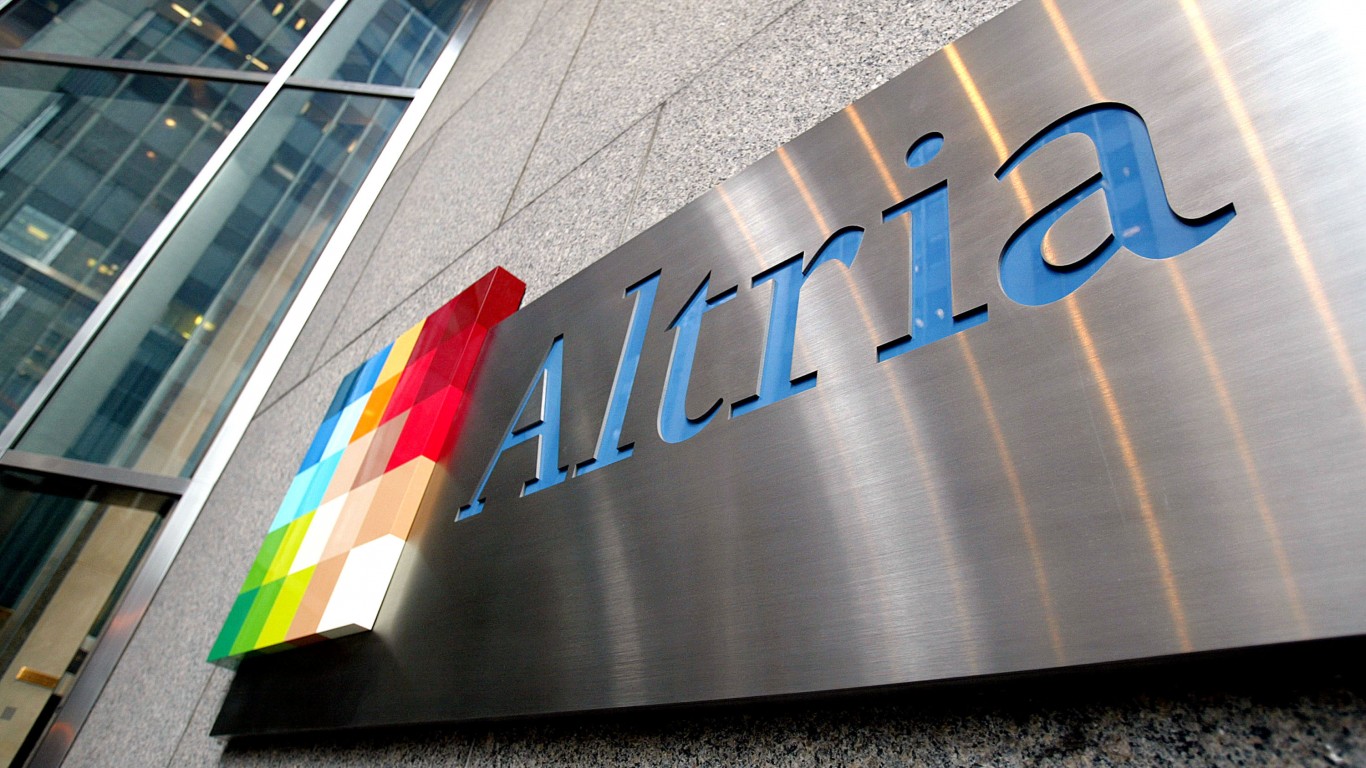
15. Altria Group Inc. (NYSE: MO), $56.00
> Industry: Tobacco
> Yield: 5.9%
> 52-week range: $42.40 – $66.04
> Market cap: $105 billion
Altria has been considered to be a top defensive stock for decades, but it is still being listed last for 2019 defensive stocks due to its very poor stock performance in 2018 and into earlier 2019. The good news is that its shares have handily recovered from their lows. Big Tobacco is still considered a key defensive industry when stock market volatility gets in the way. With investments into legalized marijuana, vaping, biotech, and chewing tobacco, Altria is planning to be in business in the decades ahead — even as the number of combustible cigarette smokers shrinks.
Want retirement to come a few years earlier than you’d planned? Or are you ready to retire now, but want an extra set of eyes on your finances?
Now you can speak with up to 3 financial experts in your area for FREE. By simply clicking here you can begin to match with financial professionals who can help you build your plan to retire early. And the best part? The first conversation with them is free.
Click here to match with up to 3 financial pros who would be excited to help you make financial decisions.
Thank you for reading! Have some feedback for us?
Contact the 24/7 Wall St. editorial team.